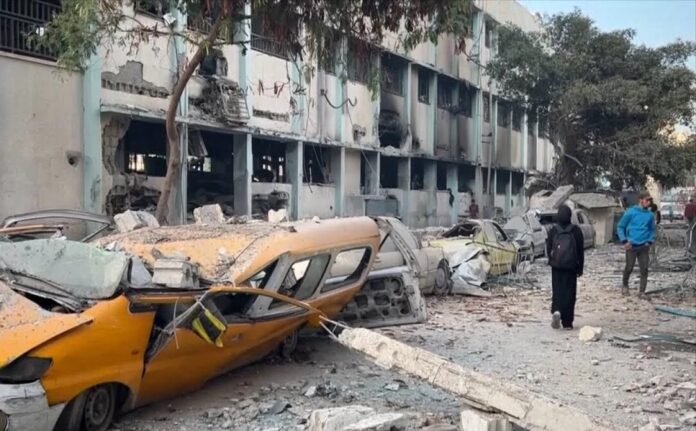The US-backed Gaza Humanitarian Foundation starts aid deliveries amid UN and local backlash
A controversial US-backed group, the Gaza Humanitarian Foundation (GHF), has begun distributing aid in Gaza, sparking widespread criticism from the UN and humanitarian organisations. On Monday, the GHF announced it had delivered truckloads of food to “Secure Distribution Sites” across Gaza, and hundreds of Palestinians queued in the southern city of Rafah to collect food parcels bearing the GHF logo.
The GHF’s distribution model deliberately bypasses the UN, which has long been the primary provider of humanitarian aid to Gaza’s 2.1 million residents. It employs armed American security contractors to guard its sites, with Israeli forces patrolling the surrounding areas. Palestinians must pass identity checks and screening for any links to Hamas to access the aid, a process that many aid agencies say “weaponises aid” and violates core humanitarian principles of neutrality and impartiality.
UN officials have refused to cooperate with the GHF’s system. Jens Laerke, spokesman for the UN Office for the Coordination of Humanitarian Affairs, called the operation “a distraction from what is actually needed” — namely, the full reopening of Gaza’s crossings and unfettered humanitarian access. He emphasised that a secure environment and rapid approval of emergency supplies are vital to address the growing famine risk in the territory.
Critics warn the GHF’s approach will exclude vulnerable groups, such as those with mobility issues, and force many Palestinians to risk dangerous journeys across Israeli military lines to reach aid sites. A displaced woman from Khan Younis expressed fear about the uncertainty and danger of crossing into Israeli-controlled zones just to feed her family. Others refused to accept aid under these conditions, viewing the system as part of a broader strategy of displacement.
Jan Egeland, secretary general of the Norwegian Refugee Council and a former UN humanitarian chief, condemned the GHF as “militarised, privatised, politicised.” He criticised the involvement of ex-CIA operatives and security firms aligned with the Israel Defence Forces, warning that allowing one party to a conflict to control aid sets a dangerous precedent and undermines neutrality.
Adding to the turmoil, Jake Wood resigned on Sunday as GHF’s executive director, stating that the group’s distribution system could not uphold principles of humanity, neutrality, impartiality, and independence. The GHF board rejected these accusations, blaming critics for obstructing aid efforts and insisting their operation is consistent with humanitarian standards. They claimed that by week’s end, their aid could feed nearly a million Palestinians—almost half Gaza’s population.
Hamas, which governs Gaza, strongly opposes the GHF’s scheme. It warned Palestinians not to cooperate, accusing the group of enforcing “engineered starvation” and using food as a weapon of war. The GHF responded by alleging Hamas had threatened aid workers and sought to block Gazans from receiving assistance at the sites.
Israel imposed a total blockade on Gaza in early March, cutting off humanitarian aid as it escalated military operations against Hamas following the group’s deadly October 2023 attacks. Prime Minister Benjamin Netanyahu has vowed to “take control of all areas” of Gaza, ordering forced displacement of civilians from the north to the south. Israel recently eased the blockade slightly, allowing limited aid shipments—around 665 lorry loads so far—but UN agencies warn this falls far short of what is needed to prevent widespread famine.
The UN-backed Integrated Food Security Phase Classification estimates that half a million people in Gaza face starvation in the coming months. Since the conflict’s outbreak, the Hamas-run Gaza health ministry reports over 54,000 fatalities, including nearly 4,000 in the past ten weeks alone.
As the humanitarian crisis deepens, the GHF’s controversial aid model highlights the complex interplay of politics, security, and survival in Gaza, where millions face hunger under siege and increasing uncertainty.
